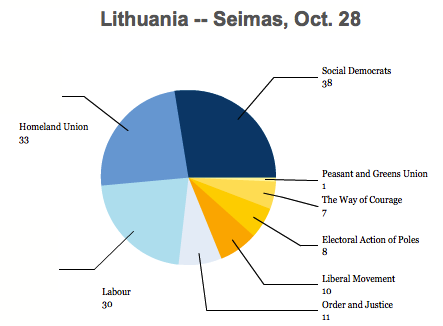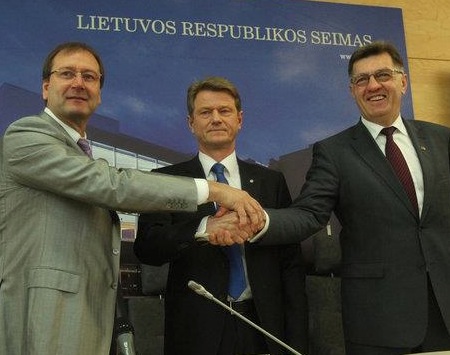Lithuanian’s highly respected president, Dalia Grybauskaitė, has upended what everyone thought would be a broad leftist coalition following the second and final round of Lithuanian parliamentary elections on Sunday.![]()
Following a victory by the social democratic Lietuvos socialdemokratų partija (LSDP, Social Democratic Party of Lithuania), which won 38 seats after the first round on October 14 and October 28, it seemed likely that the Social Democrats would form the next government, a coalition headed by Social Democratic leader and former finance minister Algirdas Butkevičius.
It had always been expected that Butkevičius would lead a broad center-left coalition with the support of the more populist Darbo Partija (DP, Labour Party), led by Russian-born Viktor Uspaskich, which won 19.95% of the first-round vote on October 14 to just 18.46% for the Social Democrats and 14.90% for outgoing prime minister Andrius Kubilius’s center-right Tėvynės sąjunga – Lietuvos krikščionys demokratai (TS-LKD, Homeland Union — Lithuanian Christian Democrats).
That October 14 vote determined the 70 seats allocated to Lithuania’s parliament, the Seimas, by proportional representation. The remaining 71 seats were determined by single-member district votes, many of which were determined in the runoff votes held last Sunday, after which the Social Democrats emerged as the largest force, followed closely by Homeland Union with 33 seats and Labour with 29.
Indeed, the Social Democrats, Labour and a third party — Tvarka ir teisingumas (TT, Order and Justice) — had agreed an electoral pact to form a government. Together, the three parties would command an absolute majority of 79 seats. So the outcome seemed more or less a fait accompli.
Until Monday, when Grybauskaitė intervened, arguing that Labour is, essentially, unfit for government, and pledging not to nominate a prime minister who will govern with Labour support:
…Grybauskaite said she refused to back a coalition which included Labor, which stands accused of buying votes during the two rounds of voting.
“A party which is suspected of gross violations in the election, which is suspected of false accounting and non-transparent activities cannot participate in the government’s formation,” the president told reporters.
She said police were investigating 27 election irregularities, 18 of which concerned alleged vote buying, with the Labor Party accused of involvement in most of them.
Grybauskaitė, a political independent, is a highly-respected former European Commission for Financial Programming and the Budget from 2004 to 2009. In the May 2009 presidential election, she became Lithuania’s first head of state by winning a whopping 69.1% victory, with her closest rival Butkevičius at 11.8% support.
On Wednesday, however, the three parties invited a fourth party, the Lietuvos lenkų rinkimų akcija (AWPL, Electoral Action of Poles in Lithuania; Akcja Wyborcza Polaków na Litwie in Polish), a Christian democratic party devoted to ethnic Polish issues, into their coalition talks, which would give it 87 seats — more than the 85-vote majority it would need to override a presidential veto. So it’s unclear that Butkevičius and his electoral allies are willing to back down, potentially setting up a constitutional showdown with Grybauskaitė, who is Lithuania’s most popular public figure by far. Continue reading Lithuania’s president throws post-election coalition talks into disarray





